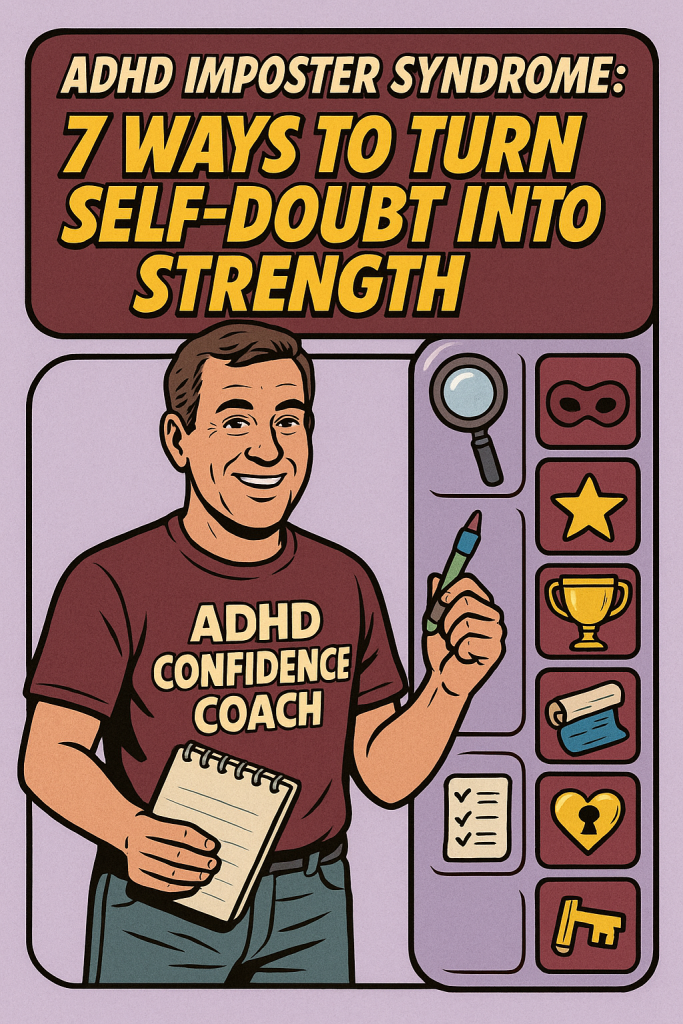ADHD Imposter Syndrome: 7 Ways to Turn Self-Doubt into Strength
When you’ve got ADHD, you’re often told you’re “too much” or “not enough” at the same time. Too intense, not focused. Too energetic, not disciplined. Too many ideas, not enough follow-through. So it’s no wonder that many adults with ADHD carry around a shadow of ADHD imposter syndrome, even when they’re brimming with potential.
While this story isn’t about any one person, it draws on situations I’ve seen time and again. It’s a made-up example that captures the kinds of challenges many people with ADHD experience, and how we might work through them.”.
Mary’s launching a neurodivergent-friendly café. Think quiet hours, sensory-friendly seating, colour-coded menus, and staff who understand what it means to stim, fidget or just need a moment. It’s the kind of place so many people wish existed.
So why did she feel like a fraud?
Let’s unpack that, and look at seven ways to reframe ADHD self-doubt as a sign you’re on to something special.
1. Recognise when ADHD imposter syndrome is holding the spoon
At the start of our session, she spoke about “not being a proper businessperson” and how she wasn’t sure people would take her seriously. She felt like she had no right to be setting up a café when she wasn’t from hospitality and didn’t have a formal business degree.
It’s a classic ADHD pattern. You have a brilliant, values-driven idea, and instead of backing yourself, you start mentally listing everyone who might be more “qualified.”
Imposter syndrome doesn’t mean you’re not ready. It means you’re brave enough to try something meaningful.
2. Your difference is your strength
The whole point of her café was that it’s not like other cafés. It’s a haven for people who are overstimulated by noise, bright lights or social pressure. Somewhere you can read, sketch, stim, or just be.
Her story came to life when she talked about how hard it had been to find spaces where she felt comfortable as a late-diagnosed autistic and ADHD woman. That experience, she realised, wasn’t a disqualifier. It was exactly why her idea mattered.
Being different isn’t a flaw. It’s the reason you’re the right person for the job.
3. Value attracts value
She was tempted to undercharge because she felt guilty about offering something niche. “What if people think it’s not worth it?” she asked.
But niche doesn’t mean less valuable. It often means more.
The right customers will see the thought, love, and intention behind her café. They’re not comparing it to a chain coffee shop. They’re looking for belonging, warmth, and calm.
When you believe in your values, the right people will believe in you.
4. ADHD often hides your achievements
Like many adults with ADHD, this client had a long list of “nearlys” and “not quites” in her head. “I always start things and don’t finish,” she said.
But when we talked about what she had done, raised money on Kickstarter, found a venue, designed a brilliant sensory menu, her face changed. “I suppose I have done quite a bit,” she said, a little stunned.
Write your wins down. Keep them somewhere visible. Because your ADHD brain might forget, but your track record speaks volumes.
5. Build your own recipe, not someone else’s
Another wobble came when she started listing everything she hadn’t done yet. No branded packaging, no staff uniforms, no official PR.
But that’s the point. She’s not building a high-street franchise. She’s creating a welcoming community space. It doesn’t have to look like anyone else’s business. It just has to work for her audience.
Start with what makes your idea magical. Build the rest later.
6. Challenges? Name them. Then tackle them.
Of course there were challenges. Time blindness, overwhelm, decision fatigue, a touch of perfectionism (because if it’s not 100 percent right, why bother at all?).
So we made a list. Then we tackled them one by one. She broke her to-do list into colour-coded chunks. She found a neurodivergent VA to help with admin. She started booking “CEO dates” in her diary to focus on planning without distractions.
You don’t have to fix everything at once. You just need a plan and a starting point.
7. Your story is your pitch
The turning point came when I asked her why she wanted to do this in the first place. She told me about being 19 and crying in the loo of a café because the noise and lights were too much, but leaving felt rude. “I just want to create the space I needed back then,” she said.
That’s not just moving. That’s the reason people will come.
Your story isn’t a liability. It’s your qualification.
Final thought
ADHD imposter syndrome is common, but it doesn’t define you. It shows up most when you’re about to do something bold, values-led, and potentially life-changing for you and for others.
The truth is, you are ready. You do belong. You’re not faking it. You’re forging it.
Click here to book your discovery call if you’d like to explore how ADHD coaching can help you turn that buzzing brain into action, clarity and courage.
See here for 5 Ways to Talk to Your Partner About Difficult Things
